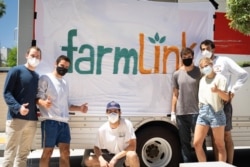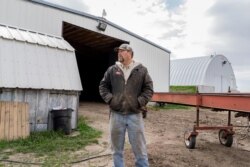In their younger years, longtime friends Aidan Reilly and James Kanoff volunteered together at a Los Angeles food bank.
When the pair landed back in their native Southern California after their universities were shut down due to COVID-19, they didn’t waste time figuring out how to help others.
“We found out that farmers could no longer fulfill orders and were burying millions of pounds of food,” said Reilly, who attends Brown University in Rhode Island. “We thought that made no sense.”
Reilly and Kanoff, a student at Stanford University in northern California, brainstormed during a phone call about what they could do to help. They looped in friend Will Collier, also a student at Brown, and the FarmLink Project was founded.
The grassroots movement now comprises a group of college students whose purpose is to prevent food waste and reduce food insecurity during the coronavirus pandemic. FarmLink raises funds to purchase excess food from farmers that is eventually delivered to food banks.
“While I was at school, I was already being productive and putting my energy toward positive things. Then, it was interrupted by having to come home,” Reilly said in an interview with VOA. “I didn’t want to lose that momentum. I wanted to continue. I didn’t want to get in a rut because mental health is so important during this time.”
More than 80 college students now work with the group.
“When I first heard about FarmLink I was very intrigued. I wanted to come in and connect with the members to help an issue that I knew was affecting my area,” said Jordan Hartzell of Lewisburg, Pennsylvania, who is studying applied mathematics and computer science at Brown. “Also, to address a problem that existed before this pandemic.”
Alex Tsai, a junior studying computer science at Stanford University, was “inspired by the quote ‘the bigger the problem, the bigger the opportunity.’
“I saw a huge opportunity to innovate a new supply chain while sustaining the livelihoods of workers, prevent produce from ending up in landfills, and put food onto the tables of those who need it most,” she said.
So far, FarmLink has moved more than 250,000 pounds of food from coast to coast and in between, delivering to California, Virginia, Utah, Michigan and Washington. The group plans to expand deliveries to the South next week.
Recently, FarmLink worked with Doug Hess, a fourth-generation potato farmer in Idaho.
“We got in contact with him after we saw that he had a mountain of an ungodly amount of potatoes in a shed that he had nowhere to put … We just delivered a little over 40,000 pounds of Doug's potatoes to a Native American community,” Reilly said.
Hess found the experience of working with FarmLink to be a positive one.
“It’s impressive to see young people recognize the problems and step up to the plate,” he said.
FarmLink recently oversaw a delivery to a Native-American community in Yreka, California.
“This morning, we had our first successful delivery to a food bank called the Siskiyou Community Food Bank, which serves a bunch of different folks in the area, including five indigenous people’s tribes,” Hartzell said.
“We're really excited to contact people who were, perhaps, underserved by some of the government relief programs that have rolled out recently regarding food waste and food banks.”
The Food Bank didn't have a loading dock, so the students rented a forklift. Two FarmLink volunteers in the Bay Area woke up at 3 a.m. and drove for five hours.
“Just hearing that it went smoothly, I think has been probably my proudest moment,” Hartzell said.
The not-for-profit organization composed solely of student volunteers puts 100% of donations into purchasing produce to feed families and to pay wages to farmers and truckers. FarmLink is hosted by the food rescue organization Food Finder in Southern California.
“I'm proud of the network that has grown. I'm proud of the fact that we have 80 students working on this and it's all for free. Nobody's making any money. Yet, they're still devoting eight to 10 hours a day, sometimes more,” Reilly said.
All donations are tax deductible, according to Reilly. Some farmers who receive, and also donate, get a fraction of the value of the food as a tax deduction, “which is another way that we're trying to help.”
“FarmLink is eager to show that delivery-by-delivery, and by the power of a grassroots effort, we can really help to ease some ramifications of a virus that has disproportionately affected the most underserved populations in America,” Tsai said in an email to VOA.
FarmLink’s goal is to get a million pounds of food delivered by the end of the month.
“I think we can do it,” Reilly said. “And if we reach that, then maybe I'll pat myself on the back. But I'll get right back to work and try to get 2 million pounds by the next week.”






